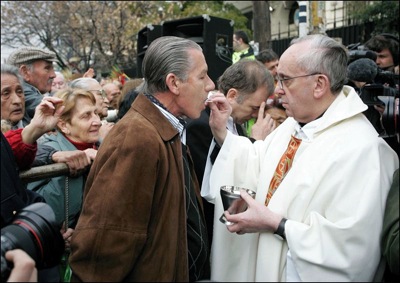 It holds true—we each see the world through our own mental glasses. Experiences, chronological age, physical and mental health, and even genetics interact to form our perceptions of the world. Perhaps the Talmud states it best, “We do not see things as they are.
We see them as we are.”
It holds true—we each see the world through our own mental glasses. Experiences, chronological age, physical and mental health, and even genetics interact to form our perceptions of the world. Perhaps the Talmud states it best, “We do not see things as they are.
We see them as we are.”
As we begin this study on the influence the Roman Catholic Church has had on the theology and practices of the church of Christ, several observations need to be made.
- A combination of information and experiences form the mental filter through which we each interpret life.
- It is easy to equate what we have done, especially for a long period of time, as the right way or as the only way.
- It is not easy and sometimes impossible to determine the original context of scripture.
- The passage of time and influence have a way of altering the original intent and meaning of an event; e.g., Christmas, Thanksgiving, Easter.
Even though it in inevitable that my comments will be influenced to some degree by my own perceptions, it is my prayerful intent to remain true to the text in content and meaning.
 Traditionally the Roman Catholic Church has taught that salvation is dispensed through seven sacraments: Baptism, Confirmation, Holy Communion, Confession, Marriage, Holy Orders, and the Anointing of the Sick. Generally the Holy Communion or sacraments are administered by the local priest, assisted by others (male and female). In this weekly observance a wafer is placed in the mouth of each recipient and followed by the recipient sipping wine from a challis, the lip of which is then wiped and readied for the next worshipper. These sacraments are given and received in a very reverent manner, and often during this time people are seen kneeling and praying. Generally the entire mass is designed to last about an hour. Promptness is encouraged but not necessarily fellowship afterward. If one is excommunicated (religious censure) certain rights are restricted, including the privilege of taking the sacraments. Inability to participate in this observance places one’s eternal salvation in jeopardy.
Traditionally the Roman Catholic Church has taught that salvation is dispensed through seven sacraments: Baptism, Confirmation, Holy Communion, Confession, Marriage, Holy Orders, and the Anointing of the Sick. Generally the Holy Communion or sacraments are administered by the local priest, assisted by others (male and female). In this weekly observance a wafer is placed in the mouth of each recipient and followed by the recipient sipping wine from a challis, the lip of which is then wiped and readied for the next worshipper. These sacraments are given and received in a very reverent manner, and often during this time people are seen kneeling and praying. Generally the entire mass is designed to last about an hour. Promptness is encouraged but not necessarily fellowship afterward. If one is excommunicated (religious censure) certain rights are restricted, including the privilege of taking the sacraments. Inability to participate in this observance places one’s eternal salvation in jeopardy.
The Protestant Reformation of the 16th century brought changes to the seven sacraments of the Catholic Church and reduced them to just two, baptism and the Lord’s Supper. Even today most evangelical churches adhere to these observances, however their meaning and the practice of them is debated. As the churches of Christ began to emerge out of the second great awakening in the early 1800s, the Lord’s Supper as a weekly observance was part of worship service. In those early days a single cup was used during the observance but with increased medical knowledge and awareness of disease, multiple cups were introduced. The use of wine was challenged in the early nineteenth century with the onset on the Temperance Movement. Various factors had contributed to an epidemic of alcoholism that seemed to correlate with spousal abuse, family neglect, and chronic unemployment. During that time grape juice was introduced as a substitute for wine.
As far as our worship service and the actual implementation of the Lord’s Supper today is concerned, marked similarities with the Catholic tradition are evident. The five acts of worship—singing, praying, preaching, giving and the Lord’s Supper—comprise the one hour Sunday worship service. Traditionally a very introspective and personal experience, the Lord’s Supper is observed in a reverent atmosphere and is often preceded by devotional thoughts and a prayer. In the majority of our congregations the emblems are passed by men among church members. Even though the church of Christ has not agreed with the transubstantiation aspect of the supper, a close connection exists between its observance and salvation. Individuals who have other Sunday morning activities planned or who are unable to attend the Sunday morning service are encouraged to participate in the supper with a small group at the conclusion of the Sunday evening service. Like in Catholic tradition, often the Lord’s Supper is considered the most important aspect of the worship experience.
In my next blog entry we will explore the scriptural references to the Lord’s Supper and their relevance to our worship today.
Gerry Parker says
Excellent articles on communion! Thank you. BTW, my daughter is a student at York and she said you gave a great message. I told her,”He usually does”. God bless!